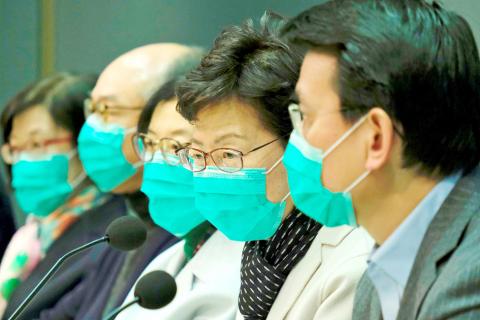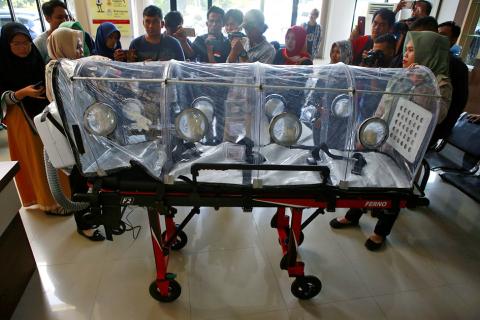Chinese President Xi Jinping (習近平) yesterday said that China was in a struggle against a “demon” epidemic, as the death toll from the new SARS-like virus soared to 106, including the first in Beijing, and the first cases of human-to-human contagion were detected abroad.
Xi made his remarks during talks with WHO Director-General Tedros Adhanom Ghebreyesus in Beijing, as a host of nations prepared to airlift their citizens from Wuhan, the epicenter of the outbreak.
“Chinese people are currently engaged in a serious struggle against an epidemic of a new type of coronavirus infection,” Xi said.

Photo: Reuters
“The epidemic is a demon, and we cannot let this demon hide,” he said, pledging that the government would be transparent and release information on the virus in a “timely” manner.
His comments came after anger simmered on Chinese social media over the handling of the health emergency by local officials in Hubei Province, where the disease first emerged last month.
Some experts have praised Beijing for being more reactive and open about this virus compared with its handling of the SARS epidemic of 2002-2003.

Photo: AFP
However, others say local cadres had earlier been more focused on projecting stability than responding to the outbreak when it began to spread earlier this month.
Since then, the number of cases has soared — doubling to more than 4,500 in the past 24 hours.
Tedros praised China’s response to the crisis during a meeting with Chinese Minister of Foreign Affairs Wang Yi (王毅), Xinhua news agency reported.
The WHO last week stopped short of declaring the outbreak a global emergency, which could have prompted a more aggressive international response such as travel restrictions.
However, global concern has been growing, with Japan and Germany yesterday reporting the first human-to-human infections outside China.
Until now, all cases in more than a dozen countries involved people who had been in or around Wuhan.
In Japan, a man in his 60s contracted the virus apparently after driving two groups of tourists from the city earlier this month, the Japanese Ministry of Health, Labor and Welfare said.
He was hospitalized with flu-like symptoms on Saturday.
On the other side of the world, a 33-year-old German man caught the disease off a Chinese colleague from Shanghai who visited Germany last week, health officials said.
The development came after countries — including Sri Lanka, Malaysia and the Philippines — announced tighter visa restrictions for people coming from China.
Hong Kong yesterday said it would cut all rail links to mainland China.
Wearing a green mask, Hong Kong Chief Executive Carrie Lam (林鄭月娥) told a news conference that train service would stop at midnight on Thursday and that the two stations connecting to the mainland would be closed.
She stopped short of a total closing of the border, as North Korea and Mongolia have done, but said that flights from the mainland would be reduced.
Experts believe the virus came from a wild animal market in Wuhan and then jumped to humans, with Chinese health officials saying that people infect each other through sneezing or coughing, and possibly through contact.
Additional reporting by AP

‘ABUSE OF POWER’: Lee Chun-yi allegedly used a Control Yuan vehicle to transport his dog to a pet grooming salon and take his wife to restaurants, media reports said Control Yuan Secretary-General Lee Chun-yi (李俊俋) resigned on Sunday night, admitting that he had misused a government vehicle, as reported by the media. Control Yuan Vice President Lee Hung-chun (李鴻鈞) yesterday apologized to the public over the issue. The watchdog body would follow up on similar accusations made by the Chinese Nationalist Party (KMT) and would investigate the alleged misuse of government vehicles by three other Control Yuan members: Su Li-chiung (蘇麗瓊), Lin Yu-jung (林郁容) and Wang Jung-chang (王榮璋), Lee Hung-chun said. Lee Chun-yi in a statement apologized for using a Control Yuan vehicle to transport his dog to a

Taiwan yesterday denied Chinese allegations that its military was behind a cyberattack on a technology company in Guangzhou, after city authorities issued warrants for 20 suspects. The Guangzhou Municipal Public Security Bureau earlier yesterday issued warrants for 20 people it identified as members of the Information, Communications and Electronic Force Command (ICEFCOM). The bureau alleged they were behind a May 20 cyberattack targeting the backend system of a self-service facility at the company. “ICEFCOM, under Taiwan’s ruling Democratic Progressive Party, directed the illegal attack,” the warrant says. The bureau placed a bounty of 10,000 yuan (US$1,392) on each of the 20 people named in

The High Court yesterday found a New Taipei City woman guilty of charges related to helping Beijing secure surrender agreements from military service members. Lee Huei-hsin (李慧馨) was sentenced to six years and eight months in prison for breaching the National Security Act (國家安全法), making illegal compacts with government employees and bribery, the court said. The verdict is final. Lee, the manager of a temple in the city’s Lujhou District (蘆洲), was accused of arranging for eight service members to make surrender pledges to the Chinese People’s Liberation Army in exchange for money, the court said. The pledges, which required them to provide identification

INDO-PACIFIC REGION: Royal Navy ships exercise the right of freedom of navigation, including in the Taiwan Strait and South China Sea, the UK’s Tony Radakin told a summit Freedom of navigation in the Indo-Pacific region is as important as it is in the English Channel, British Chief of the Defence Staff Admiral Tony Radakin said at a summit in Singapore on Saturday. The remark came as the British Royal Navy’s flagship aircraft carrier, the HMS Prince of Wales, is on an eight-month deployment to the Indo-Pacific region as head of an international carrier strike group. “Upholding the UN Convention on the Law of the Sea, and with it, the principles of the freedom of navigation, in this part of the world matters to us just as it matters in the